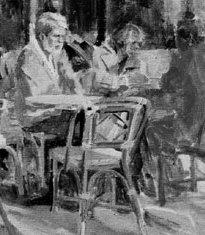Sitting beside the boulevard a person has time to think long about many things. Such as the congruence of space and time. The phenomenon rarely fails to give me a sense of wonder.
To give you an example. Yesterday evening a friend and I were conversing amiably over the telephone about this and that, as friends are wont to do, and she asked me whether or not I had seen the film The Jacket. I was mildly astonished, because I had, in fact, watched the film only the day before. Mere coincidence, you say? Perhaps. But when such congruences occur I always have the fleeting impression that they have either happened before, or that the matrix of circumstance has been scripted, that it's all been laid out beforehand. For aeons. Before the sun and moon. Before the Big Bang. Before Time.
I'd even hoped to draw parallels between Contact and The Jacket, but didn't do so when I found the previous blog becoming too lengthy. But I want to do so now.
My friend and I have spoken to some degree about the relativistic weirdness of all existence, as set forth in the theoretical speculations of quantum physics. The film Contact is so fascinating insofar as it portrays so well the wonderful strangeness of creation. It portrays an event which defies the known laws of physics, and invites the viewer to entertain possibilities beyond human understanding.
The film The Jacket also posits a seemingly unlikely possibility, although within a very different moral and dramatic milieu, and for different effect. The concept of precognition. How can such a thing be? Only in the movies, you say? Tut! How jejune. Such a thing can be, simply because we exist in far more than a single here and now. Precognition is a misleading term, as there is no pre- and post-. Metacognition might be a more suitable term. The ability to see the other "nows". And death is simply the passage to another "now". And at some point along these infinite passages one comes to realize that they have abided since the beginning.
This is merely the absinthe talking, you say? Perhaps. Still, I enjoyed watching The Jacket because I like to think that a person can come to be at a place and in a time where the pain is gone and the hurting has stopped. I think you have to admit, it's a pleasant thought.

